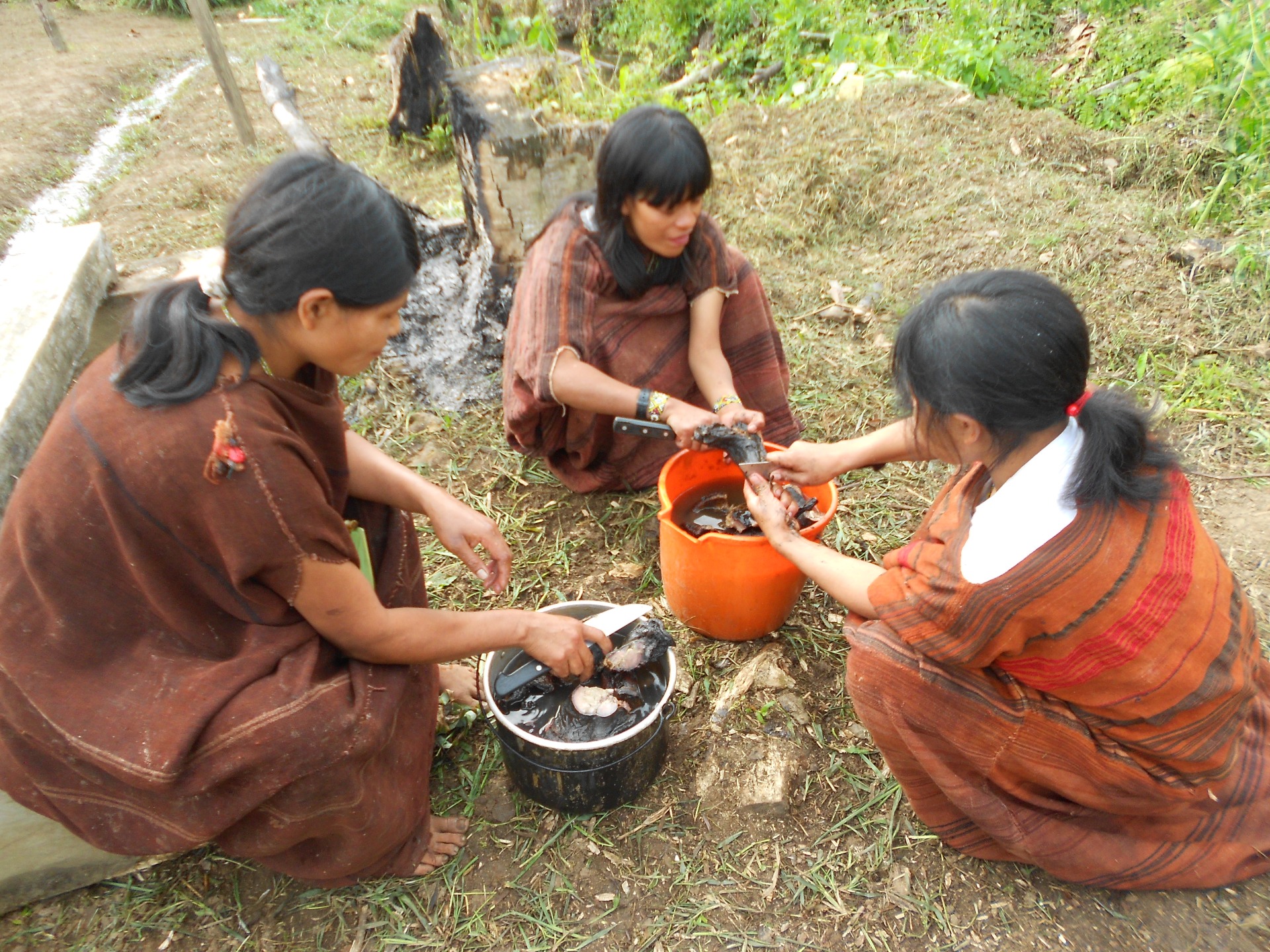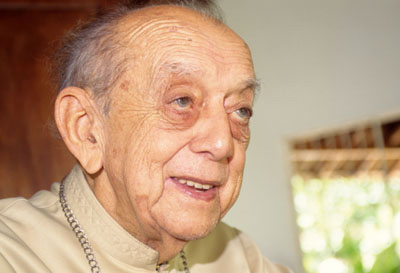
1. Support the cause of the poor

...God saw all that he had made, and it was very good... Gen. 1:31
Human beings were born in a land fitted to provide them with sustenance and the possibility to grow. For a long time, they have lived in harmony and synchrony, at times rough, with the land they inhabit. In it, they have grown and developed, sharing it with all other living beings, worshiping Mother Earth and praising the almighty God, the Creator.
Up until not so long ago, harmony with the environment has remained in an equilibrium not without tension and violence. However, this equilibrium has been broken and humanity, in its growing older, has forgotten that it is not the owner of the Earth. It has begun to see solely its own capacities and, acting under the illusion of power, mankind has begun to exploit the Earth without a sense of proportion. In its quest for dominance and power, the human race has abused the Earth, and all that is contained within it, including human beings themselves, their own siblings. And thus, we now come to the realisation that "[t]his is why the earth herself, burdened and laid waste, is among the most abandoned and maltreated of our poor" (LS 2).
It is this awakening conscience that cries out "Where is your brother?", what have you done to the Earth that I placed under your care? It is God's voice calling out for us once again to remember his commandment you will care for your brother and for the Earth.
Following the voice of Pope Francis' encyclical Laudato Si´, which picks up on this cry and passes it on to us, let us commence, here and now, the journey we have set out to recover the equilibrium and harmony we lost. Let us do so by meeting the first commandment of the decalogue, "You shall support the cause of the poor" - the starting milestone of the path we must go down. This commandment invites us to learn to acknowledge the poor, who they are, to ask them "what is your lifestyle like, where do you live?" in order to hear "come and you will see" (Jn. 1: 39).
Voices that claim...

Donald Moncayo
Living in Santa Cruz, Sucumbíos, Ecuador
"Before turning 17 I had always thought it normal to have oil stains in our rivers, lands and roads. I remember being a child and having my mother teach us to put soap on the palm of our hands before going into the river. Next, we had to approach the river slowly and put our hands in first. This made the oil stains move away and only then could we go into the river, our hands fisted to make sure we did not run out of soap - this allowed us to open our hands and make the oil move away again when the time to come out of the river came. That way, we managed to get out of the water with no oil stains on us."
This is how Donald Moncayo explains the harsh reality of the Sacha, the Sushufindi and the Lago Agrio people in the Ecuadorian Amazon, due to the contamination caused by the oil company Chevron-Texaco, from 1964 to 1992.

Helder Cámara
Brazilian Bishop (1909-1999)
"We cannot imagine the extent to which the legacy of misery leaves a mark on humanity, a mark of servility and fatality...it hurts to see how the poor inhabitants of the rural environment carry themselves sometimes, the pace of slaves, the gaze of slaves, the words of slaves. What does it mean to preach the gospel to these men if not to promote them, awakening in them an awareness of development, of self-promotion, of freedom?"
"If I feed the poor, I am deemed a saint, but if I ask why the poor starve, I am deemed a communist."
Helder Cámara (1909 - 1999) was a Brazilian Bishop known for the evangelisation and defence of the people suffering misery in impoverished countries. He was known as the "Bishop of the poor", and was living proof that liberation theology is possible while remaining faithful to the Church.
CRIES FOR JUSTICE IN THE ECUADORIAN AMAZON

Moncayo represents 30,000 people affected by corporate irresponsibility,
which has contaminates rivers, swamps and lands belonging to indigenous
communities and peasants of the region.
"When I turned 17 I left my village due to family reasons and I got to know other places where children and teens lived in clean lands and they swam and drank directly from the river. These rivers and lakes had no oil stains. It was then that I realised that there was something with life in my village that was not right. I started to read and look more into it and I have been fighting for Chevron-Texaco to acknowledge its crimes against life, Human Rights and Environmental Rights ever since"
Donald Moncayo explains that Texaco built 22 separation pools for formation waters (a highly toxic liquid found in the subsoil before the crude oil) and 880 crude oil maintenance pools. Through this practice, the company spilled over 16.8 million gallons (63.5 million litres) of oil into the ecosystem; 18.5 billion gallons (70 billion litres) of toxic water dumped into soil and waters, and 235 billion cubic feet of gas (6,650,500 m3) burned outdoors.
"To date, thousands of families suffer the consequences of this pollution, skin diseases, various types of cancer, stomach diseases, highly toxic agricultural lands, extreme poverty. That's the legacy of the company that our governments said would bring progress and development to our people."
Texaco, the oil company which merged with Chevron in 2001, exploited hydrocarbons from 1964 to 1992 without complying with the minimum environmental standards required by the industry. Two million hectares of the Ecuadorian Amazon are affected today, and 30,000 people began an intense struggle more than two decades ago for Chevron-Texaco to pay compensation.

In 2011, an Ecuadorian court determined Chevron's liability for environmental contamination in the country's Amazon, and ordered the company to pay compensation. In 2013, Ecuador's Supreme Court upheld the lower court's ruling and set the compensation at 9.5 billion dollars. However, Chevron has refused to pay.
The population affected require the broadest international solidarity. A way to support, says Donald Moncayo, "is to organize and fight so that these oil companies do not continue to bring pollution, death and destruction to other parts of the world."


What can you do (or stop doing)?

1. Reflect on the causes of environmental degradation and poverty and their consequences. This can be a good starting point to get involved and take part on the determination to take care of creation. In Enlázate por la Justicia we are looking to contribute to the promotion of this consideration. Therefore, we encourage you to watch out for any updates on the campaign and partake in whatever activities are promoted. The campaign will be disseminated in dioceses and parishes to invite participation. Remember: every two months we will launch a new principle of the green decalogue.

4. Deepen your commitment to the social activities that you contribute to if you already participate and, if you don't, give it a thought to start doing so. There is a wide range of activities and organisations of the Church which make the cause of the poor their own. It is an exciting moment in which we can address social and environmental problems as what they are, a great challenge that concerns us all.

2. Read the encyclical Laudato Si' (LS) if you get the chance. The words of Pope Francis are revealing about the situation of the world, they will help you to better understand what is happening and how we can contribute to a better and more just world for all.
5. When you walk down the street, try to see instead of just looking, try to listen instead of just hearing. Gain conscience of the reality of poverty that exists around us, in the streets, in the squares, in the ATMs (often times the cause of indigence), in the queues for soup kitchens. Go to the Immigrant Internment Centers, get in touch with this reality and listen to the poor, to the person deprived of Rights, shall they approach you. In them is Jesus. And always ask yourself why, why?

3. Also in common. Personal reflection is very important but, what about encouraging community reflection in your parish, in your family, at work or among your group of friends? A good way might be to share the contents of the campaign or to encourage some activity for joint reflection. For example, what if you organized a group to read and comment together on the LS? Reading can be more enriching in a group and you will certainly make interesting reflections together.

6. We live in a beautiful world, a miracle in the midst of the universe with just the proper conditions for life to take place in all its wonderful diversity and beauty. It is a great gift, and it is just to thank God for all those wonderful things that the Earth has to offer us and to ask Him to enlighten us in our commitment to the care of Creation.
Prayer

Our Father, Who art in Heaven, and also among us, within everything in creation.
Hallowed be Thy name by the breath of air and the murmur of waters, the fecundity of the Earth, the beauty of the valleys and mountains, the existence of all living beings, and the dignity of human beings.
Thy Kingdom come of truth and life, of justice, of love and peace.
Thy will be done on earth as it is in Heaven. Thy will to see happiness in all your children, to respect all forms of life.
Give us this day our daily bread so that it can be shared to ensure that everyone has enough to live their lives to the fullest.
And forgive us our trespasses and our lack of love for others, our greed, our individualism, our exploitation of the environment, and our lack of care for other living beings and future generations.
As we forgive those who trespass against us in search for reconciliation by means of justice and peace.
And lead us not into temptation to turn our backs on you, to ignore our siblings, to forget or overlook the poor, to abuse and exploit the creation instead of caring for it.
But deliver us from evil, the evil to destroy or damage life in all beings, the harmony in the universe.
